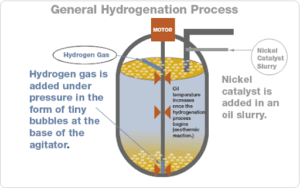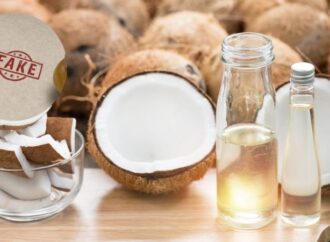Hydrogenated oil is a common ingredient in processed foods because it enhances shelf life and stability. Manufacturers use it in products like margarine, baked goods, snacks, and fried foods. Although hydrogenated oil comes from natural sources such as soybeans and sunflowers, the process that creates it is synthetic. This process turns liquid vegetable oils into solid or semi-solid fats, helping products stay fresh for longer. However, trans fats in hydrogenated oils raise serious health concerns.
The Hydrogenation Process

Manufacturers add hydrogen to liquid vegetable oils during hydrogenation, initiating a chemical reaction that alters the oil’s molecular structure. This process enhances the oil’s stability and resistance to spoilage, making it ideal for food production. For instance, manufacturers use hydrogenation to create margarine and shortening, which serve as substitutes for butter. Although the process produces stable oils, it also results in partially hydrogenated oils (PHOs) that contain harmful trans fats.
Uses of Hydrogenated Oils
Hydrogenated oils are highly versatile, which is why several industries use them:
- Food Industry: Food producers use hydrogenated oils to extend the shelf life of baked goods, snacks, and fried foods. These oils resist oxidation and remain stable during cooking and frying. Common products containing hydrogenated oils include cookies, pies, frozen foods, and non-dairy creamers.
- Cosmetics: Cosmetic companies use hydrogenated oils for their emollient properties. They add them to lotions, creams, and lip balms to help moisturize and soften skin.
- Pharmaceuticals: Pharmaceutical companies use hydrogenated oils as excipients or carriers for active ingredients, ensuring stable drug delivery.
- Industrial Applications: The stability and heat resistance of hydrogenated oils make them useful as lubricants and coatings in industrial processes.
- Biofuels: Manufacturers can process certain hydrogenated oils from renewable plant sources into biodiesel, providing an eco-friendly alternative to petroleum-based fuels.
Health Implications of Hydrogenated Oil
Hydrogenated oils, particularly those containing trans fats, pose significant health risks. Below are the key implications:
- Heart Disease: Trans fats increase “bad” cholesterol (LDL) while lowering “good” cholesterol (HDL), leading to clogged arteries, and raising the risk of heart attacks and strokes.
- Increased Diabetes Risk: Hydrogenated oils can impair insulin sensitivity, contributing to insulin resistance and type 2 diabetes, especially with a high intake of processed foods.
- Chronic Inflammation: Trans fats promote inflammation, which is linked to heart disease, diabetes, and cancer. They damage blood vessels, worsening cardiovascular risks.
- Obesity and Weight Gain: Trans fats, found in processed, calorie-dense foods, contribute to unhealthy weight gain and abdominal fat, which increase the risks of heart disease and diabetes.
- Liver Damage: High trans fat intake is associated with non-alcoholic fatty liver disease (NAFLD), which can lead to liver inflammation and scarring.
- Cancer Risk: Emerging studies suggest trans fats may increase risks for cancers like breast and prostate, likely due to their inflammatory effects.
- Pregnancy Risks: Trans fats can affect fetal brain development and increase risks of preterm birth, low birth weight, and gestational diabetes.
- Endothelial Dysfunction: Trans fats damage the cells lining blood vessels, promoting hypertension and cardiovascular diseases.
- Cognitive Decline: High trans fat consumption may impair brain function and increase risks of neurodegenerative diseases like Alzheimer’s.
Types of Hydrogenated Oil
Hydrogenated oils come in two main types: partially hydrogenated oils (PHOs) and fully hydrogenated oils.
Partially Hydrogenated Oils (PHOs)
Manufacturers create PHOs by adding hydrogen to liquid vegetable oils, but they stop before the process is fully completed. This partial hydrogenation results in trans fats, which significantly increase the risks of heart disease, diabetes, and inflammation. Companies have used PHOs extensively in processed foods like margarine, baked goods, and fried snacks to improve texture and extend shelf life. However, due to the health dangers associated with trans fats, the U.S. Food and Drug Administration (FDA) banned PHOs in food production starting in 2018, although some PHOs may still appear in imported or older products.
Fully Hydrogenated Oils:
Manufacturers fully hydrogenate oils through a complete hydrogenation process, converting them into saturated fats without producing trans fats. While these oils are safer than partially hydrogenated oils (PHOs), they remain high in saturated fats, which can increase the risk of heart disease if consumed in excess. Producers commonly use fully hydrogenated oils in products like shortening and some baked goods.
Although fully hydrogenated oils do not contain harmful trans fats, it’s advisable to limit their intake and focus on healthier fats, such as unsaturated fats from plant-based oils, nuts, and fish.
Bottom Line
In summary, while fully hydrogenated oils are safer than partially hydrogenated oils and do not contain harmful trans fats, they are still high in saturated fats. To promote better health, it’s important to limit the intake of these oils and choose healthier alternatives. Incorporating more unsaturated fats from sources like plant-based oils, nuts, and fish can support heart health and overall well-being. Making mindful dietary choices can help reduce the risks associated with unhealthy fats.
 Food Manifest
Food Manifest 


















